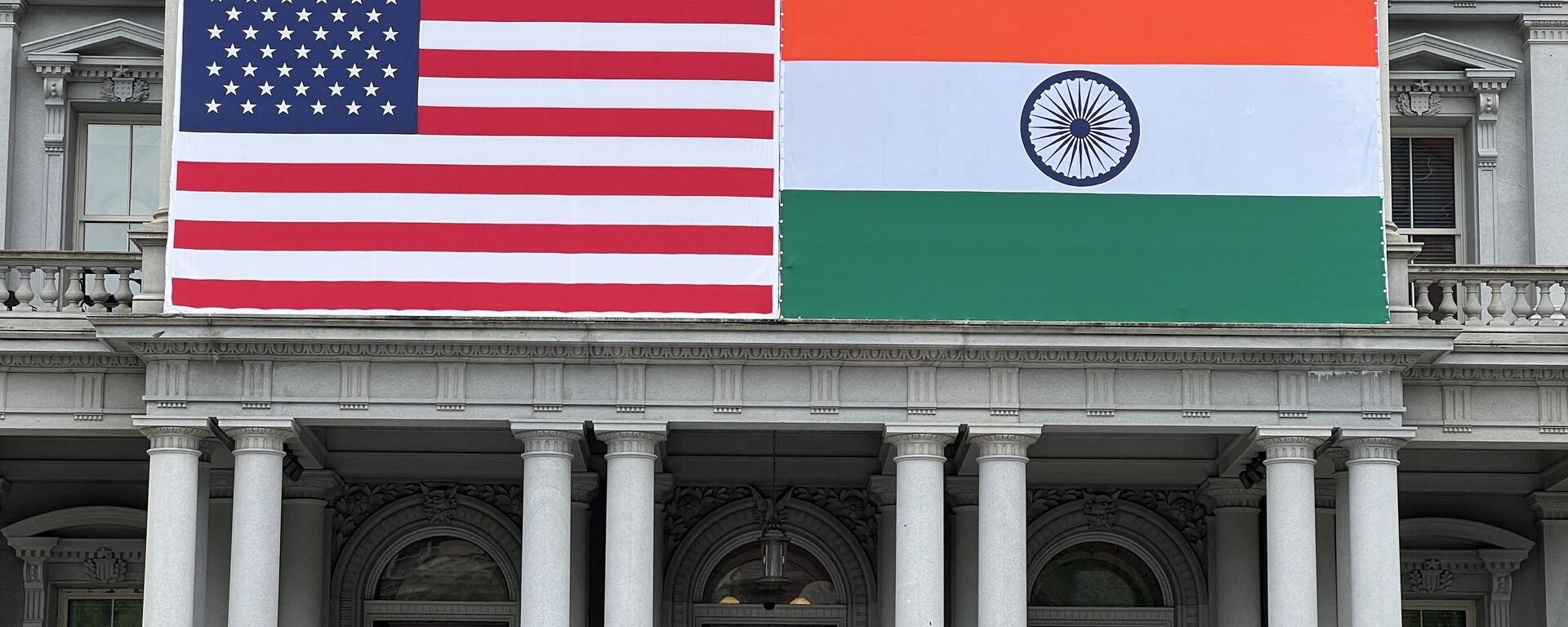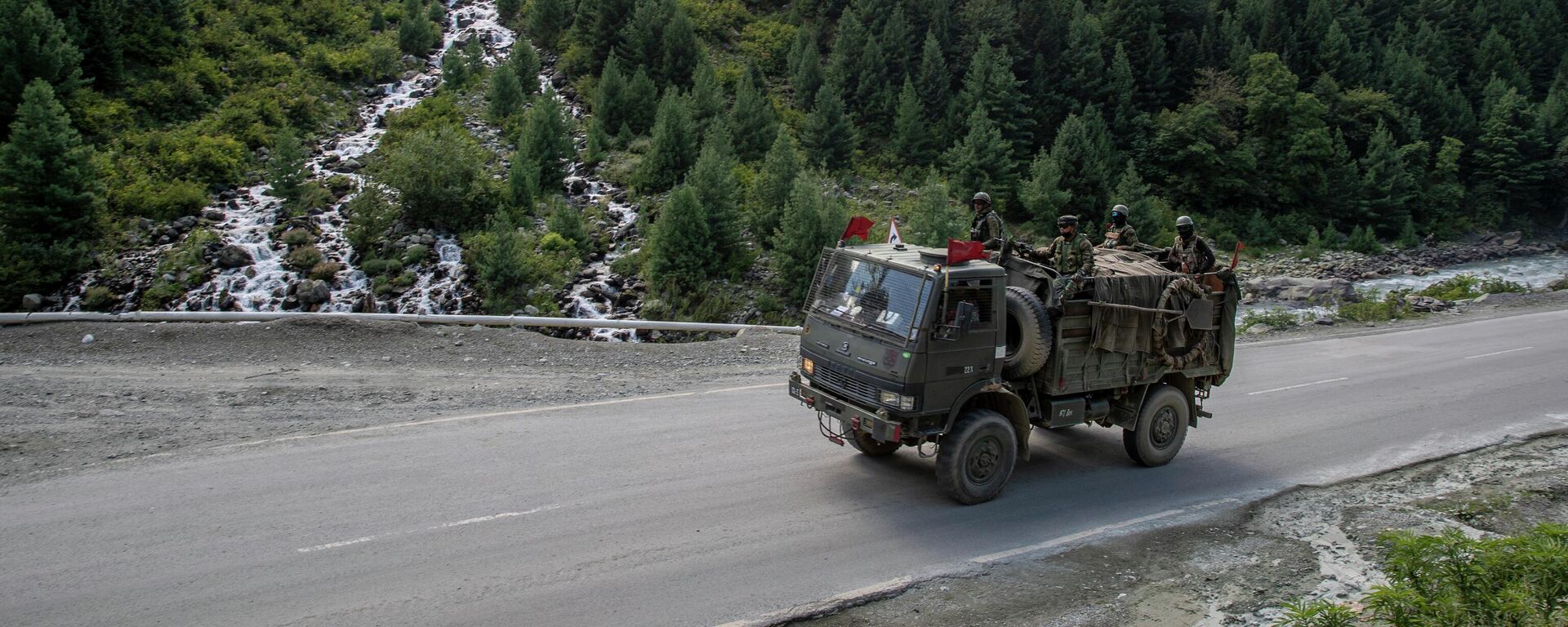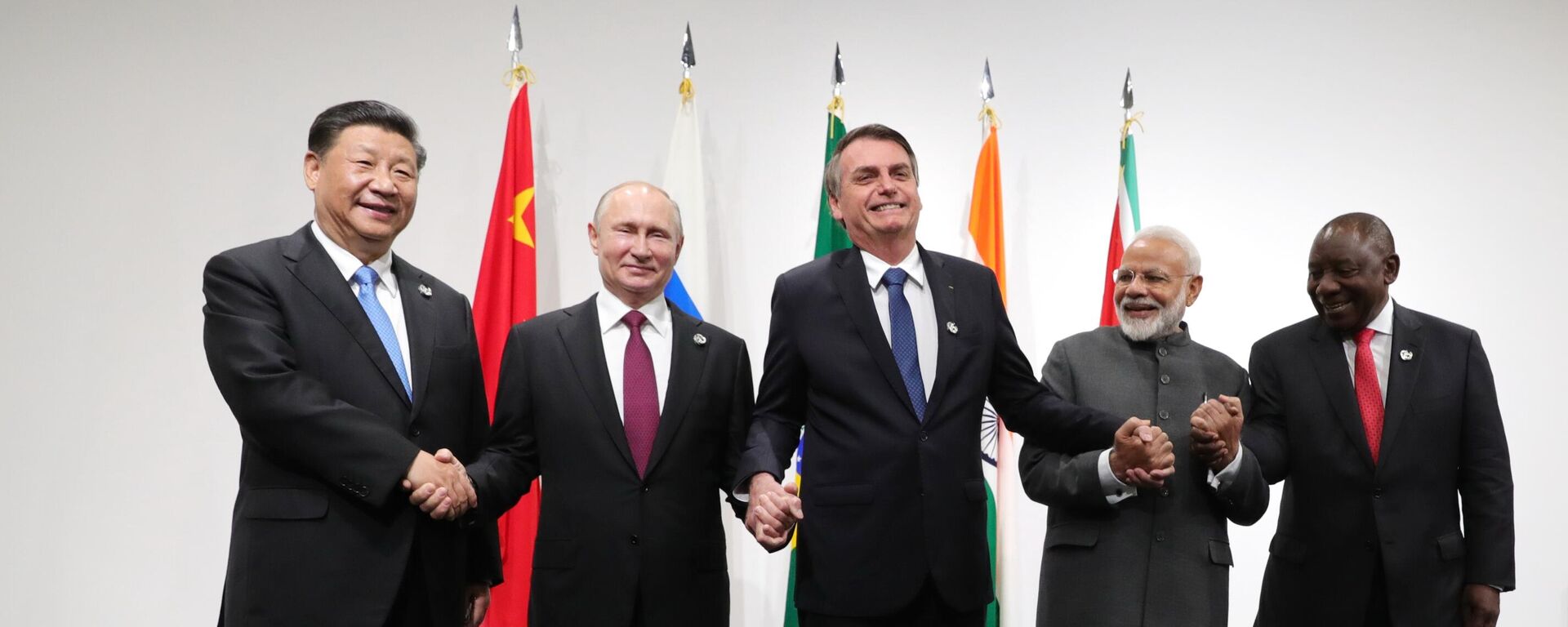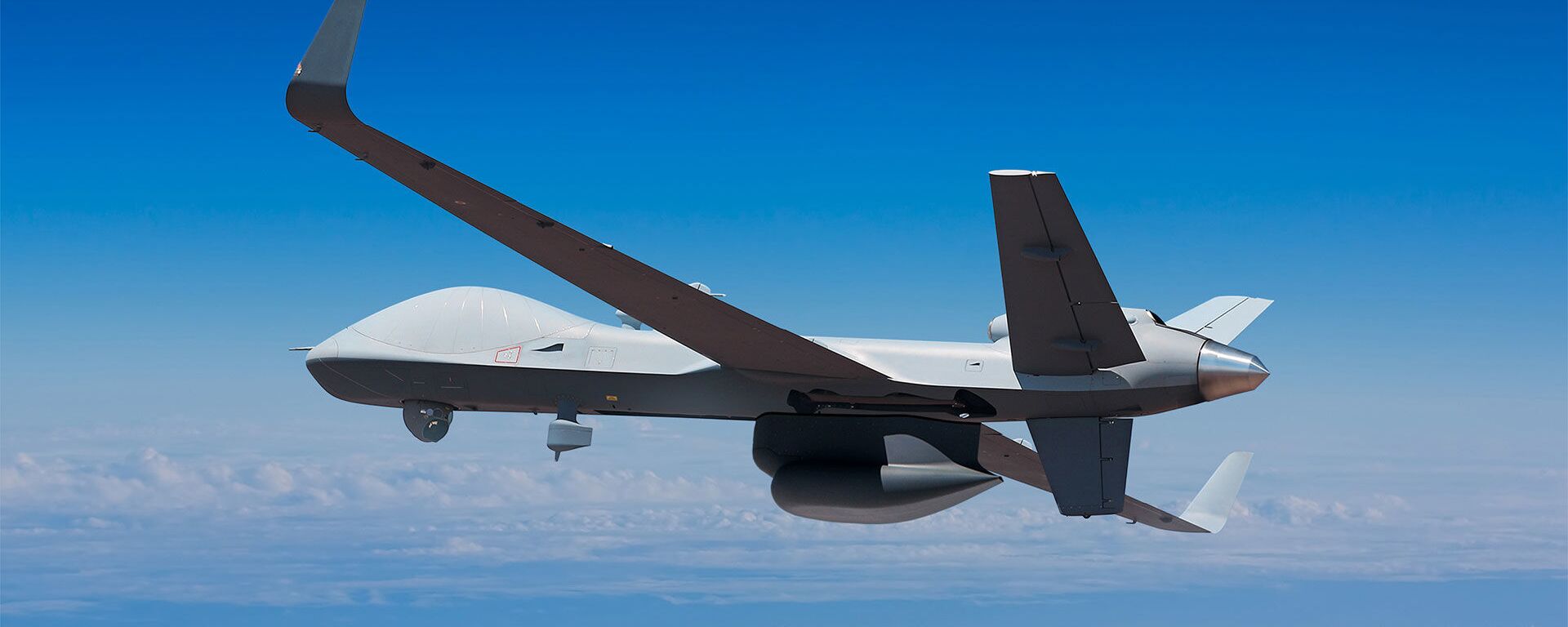https://sputnikglobe.com/20230623/modis-big-us-trip-pm-tells-off-biden-to-his-face-wont-tow-us-line-on-ukraine-1111427821.html
Modi's Big US Trip: PM Tells Off Biden to His Face, Won't Tow US Line on Ukraine
Modi's Big US Trip: PM Tells Off Biden to His Face, Won't Tow US Line on Ukraine
Sputnik International
Indian Prime Minister Narendra Modi is winding down his trip to the US, meeting President Biden and addressing Congress on Thursday.
2023-06-23T18:41+0000
2023-06-23T18:41+0000
2023-09-03T15:57+0000
joe biden
narendra modi
china
russia
india
us
white house
congress
visit
outcome
https://cdn1.img.sputnikglobe.com/img/07e7/06/17/1111427508_0:160:3074:1889_1920x0_80_0_0_ecdea95d0b7000baf3a129a450f34642.jpg
Modi’s visit to the US has been hailed by both sides as a major success, with the two nations signing a flurry of agreements in fields ranging from technology sharing and space cooperation to semiconductors, industry, academic and scientific collaboration, clean energy, minerals, and private sector investment.On the military cooperation front, the two countries signed a deal allowing US defense giant GE to build jet engines for military aircraft in India in cooperation with Hindustan Aeronautics. Modi and Biden also welcomed Delhi’s plans to purchase a maritime variant of General Atomics’ MQ-9 Reaper drone, with the $3 billion agreement envisioning the UAVs’ assembly in India.In another much talked about development, US warships have been given the okay to stop over at Indian shipyards to undergo repairs, formalizing in writing a practice that began last year.“Two great nations, two great friends, and two great powers. Cheers,” Biden said later at a state dinner in his high profile guest’s honor."You are soft spoken, but when it comes to action, you are very strong," Modi replied.Modi Won't Budge on UkrainePursuant to diplomatic traditions established by Delhi after India achieved independence in 1947, Modi did not kowtow to the US on issues relating to Indian sovereignty and foreign policy independence. For example, the India-US joint statement brought up the Ukrainian crisis only in the context of its "terrible and tragic humanitarian consequences," with a focus on the need for "greater efforts to mitigate the consequences" of the conflict, "especially in the developing world."China was not mentioned in the document directly at all, but only hinted at in the context of the need to maintain "freedom of navigation and overflight" in Indo-Pacific, and address "challenges to the maritime rules-based order, including in the East and South China Seas." The US side even paid lip service to "the importance of adherence to international law, particularly as reflected in the United Nations Convention on the Law of the Sea," even though Washington isn't even a party to that landmark 1982 treaty.In his address to Congress on Thursday, Modi again mentioned the severe impact the Ukraine crisis has had on the Global South, reiterating that the current era should be an era of "dialogue and diplomacy," not of conflict.Modi to Biden: Don’t Meddle in Indian AffairsAt their press conference, Modi, once banned from setting foot in the US over his alleged "severe violations of religious freedom" while serving as chief minister of the state of Gujrat, told Biden and US journalists that criticism of India's treatment of minorities is misplaced and unacceptable.Biden, who berated Modi’s government on the campaign trail in 2020 over India’s actions in Kashmir, sheepishly refrained from repeating these criticisms while standing alongside the prime minister in the White House, instead assuring he and Modi “had a good discussion about democratic values” and “respect each other.”US Will Try to Exploit India’s Vulnerabilities on China“I am very strongly of the view that the US has been taking advantage of our concerns relating to China,” Talmiz Ahmed, a former Indian diplomat and strategic affairs expert, told Sputnik India, pointing to the Biden administration’s efforts to “massage the ego” of India’s prime minister during his visit.The observer pointed out that until the escalation of border tensions in Eastern Ladakh in 2020, India and China's interests in the Indian Ocean were actually more or less aligned, focusing on the need to secure vital shipping lanes for energy and trade.For the former diplomat, the agreement to allow US warships to access Indian ports is “deeply concerning,” given the threat of Washington dragging Delhi into its escalating confrontation with Beijing.On top of that, he said, the 2021 US ‘freedom of navigation’ mission in India’s Exclusive Economic Zone, which sparked outrage from Delhi at the time, demonstrates perfectly that Washington will attempt to bully the Asian nation into submission if it won’t agree with US security policy.Alexei Kupriyanov, an expert on South Asia and Indian Ocean affairs at Russia’s Institute of World Economy and International Relations, says as far as US-Indian military cooperation is concerned, it’s important not stress that allowing US warships to repair vessels in Indian ports does not mean “American military bases in India."“This must be understood because this is the principled Indian position that there are [to be] no foreign military bases on [its] territory,” Kupriyanov told Sputnik India.Non-AlignmentFor his part, Dr. Zhiqun Zhu, a professor of political science and international relations at Bucknell University in Pennsylvania, said that notwithstanding US efforts to bring Delhi in as a full-fledged member of its anti-China bloc, the two countries’ policies “do not converge completely,” because India sees China as more of a “regional rival” rather than a “global challenger” in every area.Of course Washington would like India to play a "more active role in the US Indo-Pacific strategy," the academic noted. "However, India has been ambiguous and ambivalent in its China policy," refusing to throw its “full support behind the US Indo-Pacific strategy."Weapons Deals and Tech Transfer Pipe DreamsTalmiz Ahmed dismissed the significance of the technology transfer agreements signed during Modi’s visit, pointing out that the US hasn't actually engaged in technology transfers with other countries in decades, and "has never transferred state-of-the-art technology."Pravin Sawhney, an acclaimed Indian author and editor of Force Magazine, an Indian national security affairs publication, agreed with Ahmed’s assessment, telling Sputnik India that US had shared very “little” with India, and adding he isn’t even sure India will receive US jet engine technology despite the "hyped" optimism in Indian media.Sawhney also tamped down the significance of the Reaper drone deal, saying the costly US drones are "a very slow-moving unmanned aircraft" which require "a lot of pilots on the ground" to keep them in the air. On top of that, he said, India's military won't be able to receive all of the information collected by the drones in "real-time."For his part, Alexander Mikhailov, the head of the Bureau of Military-Political Analysis, a Russian military affairs think tank, told Sputnik India that Delhi’s defense deals with the US are a politically motivated push on Washington’s part to eat into Russia’s market share in India’s arms imports, which also includes uncompetitive practices like sanctioning Russian organizations, intermediaries, contractors and even clients. "There is more politics here than military affairs," he said."The Americans are playing their game here and it is beneficial for them to drive wedges between India and Russia, India and China," Mikhailov said.Ultimately, the observer expressed confidence in Delhi’s ability to maneuver through these diplomatic minefields, pointing out that Indians are "very smart" when it comes to geopolitics, demonstrating their ability to maneuver between East-West power centers going to back to the days of the Cold War to maximize their own advantage without jeopardizing ties with any major power.
https://sputnikglobe.com/20230621/modi-biden-summit-can-us-pry-india-from-brics-orbit-1111365147.html
https://sputnikglobe.com/20230323/report-us-gave-india-unprecedented-intelligence-used-in-border-clash-with-china-1108706608.html
https://sputnikglobe.com/20230616/growth-of-brics-could-accelerate-de-dollarization-1111210989.html
https://sputnikglobe.com/20230608/military-vet-new-japan-taiwan-drone-fleet-is-part-of-us-plan-to-contain-china-1111011747.html
https://sputnikglobe.com/20230525/russia-boosts-hydrocarbon-exports-to-india--novak--1110578742.html
china
russia
Sputnik International
feedback@sputniknews.com
+74956456601
MIA „Rosiya Segodnya“
2023
News
en_EN
Sputnik International
feedback@sputniknews.com
+74956456601
MIA „Rosiya Segodnya“
Sputnik International
feedback@sputniknews.com
+74956456601
MIA „Rosiya Segodnya“
narendra modi, joe biden, united states, india, ukraine, china, world order, analysis, affairs, policy
narendra modi, joe biden, united states, india, ukraine, china, world order, analysis, affairs, policy
Modi's Big US Trip: PM Tells Off Biden to His Face, Won't Tow US Line on Ukraine
18:41 GMT 23.06.2023 (Updated: 15:57 GMT 03.09.2023) Indian Prime Minister Narendra Modi is winding down his trip to the US, meeting President Biden and addressing Congress on Thursday. Washington feted the leader in grand style amid its escalating strategic competition with Beijing and Moscow, but failed to rip Delhi from its long-standing policy of strategic independence, observers told Sputnik.
Modi’s visit to the US has been hailed by both sides as a major success, with the two nations signing a
flurry of agreements in fields ranging from technology sharing and space cooperation to semiconductors, industry, academic and scientific collaboration, clean energy, minerals, and private sector investment.
On the military cooperation front, the two countries signed a deal allowing US defense giant GE to build jet engines for military aircraft in India in cooperation with Hindustan Aeronautics. Modi and Biden also welcomed Delhi’s plans to purchase a maritime variant of General Atomics’ MQ-9 Reaper drone, with the $3 billion agreement envisioning the UAVs’ assembly in India.
In another
much talked about development, US warships have been given the okay to stop over at Indian shipyards to undergo repairs, formalizing in writing a practice that
began last year.
“The challenges and opportunities facing the world in this century require that India and the United States work together and lead together, and we are,” Biden said as he welcomed Modi at the White House Thursday.
“Two great nations, two great friends, and two great powers. Cheers,” Biden said later at a state dinner in his high profile guest’s honor.
"You are soft spoken, but when it comes to action, you are very strong," Modi replied.
Modi Won't Budge on Ukraine
Pursuant to diplomatic traditions established by Delhi after India achieved independence in 1947, Modi did not kowtow to the US on issues relating to Indian sovereignty and foreign policy independence. For example, the India-US
joint statement brought up the Ukrainian crisis only in the context of its "terrible and tragic humanitarian consequences," with a focus on the need for "greater efforts to mitigate the consequences" of the conflict, "especially in the developing world."
China was not mentioned in the document directly at all, but only hinted at in the context of the need to maintain "freedom of navigation and overflight" in Indo-Pacific, and address "challenges to the maritime rules-based order, including in the East and South China Seas." The US side even paid lip service to "the importance of adherence to international law, particularly as reflected in the United Nations
Convention on the Law of the Sea," even though Washington isn't even a party to that landmark 1982 treaty.
Biden sought to focus on the "humanitarian tragedies unleashed by Russia’s brutal war in Ukraine" in his press briefing with Modi. The Indian prime minister didn’t take the bait, instead emphasizing that "from the very beginning of events in Ukraine, India has laid emphasis on resolution of dispute through dialogue and diplomacy." A prospect which Russia has welcomed, but which the US and its allies have deliberately and systematically sabotaged, incidentally.
In his address to Congress on Thursday, Modi again
mentioned the severe impact the Ukraine crisis has had on the Global South, reiterating that the current era should be an era of "dialogue and diplomacy," not of conflict.
Modi to Biden: Don’t Meddle in Indian Affairs
At their press conference, Modi,
once banned from setting foot in the US over his alleged "severe violations of religious freedom" while serving as chief minister of the state of Gujrat, told Biden and US journalists that criticism of India's treatment of minorities is misplaced and unacceptable.
"We are a democracy. India and America both have democracy in our DNA. Democracy is in our spirit and we live it and it’s written in our constitution," Modi said. "So, there is no question of discrimination on the grounds of caste, creed or religion arising."
Biden, who
berated Modi’s government on the campaign trail in 2020 over India’s actions in Kashmir, sheepishly refrained from repeating these criticisms while standing alongside the prime minister in the White House, instead assuring he and Modi “had a good discussion about democratic values” and “respect each other.”
US Will Try to Exploit India’s Vulnerabilities on China
“I am very strongly of the view that the US has been taking advantage of our concerns relating to China,”
Talmiz Ahmed, a former Indian diplomat and strategic affairs expert, told Sputnik India, pointing to the Biden administration’s efforts to “massage the ego” of India’s prime minister during his visit.
"There has been a significant opening of the Indian Ocean to the US and other Western navies under their respective Indo-Pacific strategies," he said.
The observer pointed out that until the escalation of border tensions in Eastern Ladakh in 2020, India and China's interests in the Indian Ocean were actually more or less aligned, focusing on the need to secure vital shipping lanes for energy and trade.
Taking note of Secretary of State Blinken’s trip to China shortly before Modi’s US visit, Ahmed said it appears obvious that Washington "wants to aggravate tensions between India and China to serve its own geopolitical goals."
For the former diplomat, the agreement to allow US warships to access Indian ports is “deeply concerning,” given the threat of Washington dragging Delhi into its escalating confrontation with Beijing.
On top of that, he said, the 2021 US ‘freedom of navigation’ mission in India’s Exclusive Economic Zone, which sparked outrage from Delhi at the time, demonstrates perfectly that Washington will attempt to bully the Asian nation into submission if it won’t agree with US security policy.
Nevertheless, Ahmed expressed confidence that India will not give up its strategic independence, because this is something “deeply ingrained in the Indian psyche,” and there’s “nothing that can happen in the world that can change that.”
Alexei Kupriyanov, an expert on South Asia and Indian Ocean affairs at Russia’s Institute of World Economy and International Relations, says as far as US-Indian military cooperation is concerned, it’s important not stress that allowing US warships to repair vessels in Indian ports does not mean “American military bases in India."
“This must be understood because this is the principled Indian position that there are [to be] no foreign military bases on [its] territory,” Kupriyanov
told Sputnik India.
For his part,
Dr. Zhiqun Zhu, a professor of political science and international relations at Bucknell University in Pennsylvania,
said that notwithstanding US efforts to bring Delhi in as a full-fledged member of its anti-China bloc, the two countries’ policies “do not converge completely,” because India sees China as more of a “regional rival” rather than a “global challenger” in every area.
“India, though concerned about China’s expanding power, still shares many interests with China as [a fellow] developing nation. Notably, India’s national security is not built upon competition with China,” Zhu said, pointing to both nations’ advocacy for the interests of low and middle-income countries in the Global South, for example.
Of course Washington would like India to play a "more active role in the US Indo-Pacific strategy," the academic noted. "However, India has been ambiguous and ambivalent in its China policy," refusing to throw its “full support behind the US Indo-Pacific strategy."
"India is unlikely to ditch its longstanding non-alignment policy and fully join the US to counter China or Russia," Zhu stressed, pointing to Indian membership in multilateral forums with the latter two nations in both BRICS and the Shanghai Cooperation Organization. Accordingly, Washington should “lower its expectations” in trying to use Delhi to try to 'contain' Beijing, "especially in security and military dimensions," the observer said.
Weapons Deals and Tech Transfer Pipe Dreams
Talmiz Ahmed dismissed the significance of the technology transfer agreements signed during Modi’s visit, pointing out that the US hasn't actually engaged in technology transfers with other countries in decades, and "has never transferred state-of-the-art technology."
Pravin Sawhney, an acclaimed Indian author and editor of Force Magazine, an Indian national security affairs publication, agreed with Ahmed’s assessment,
telling Sputnik India that US had shared very “little” with India, and adding he isn’t even sure India will receive US jet engine technology despite the "hyped" optimism in Indian media.
"They intend on transferring the assembly of the engine. It is not really the transfer of technology. It will not involve the transfer of technology. The know-how and the know-why will not be shared," Sawhney said.
Sawhney also tamped down the significance of the Reaper drone deal, saying the costly US drones are "a very slow-moving unmanned aircraft" which require "a lot of pilots on the ground" to keep them in the air. On top of that, he said, India's military won't be able to receive all of the information collected by the drones in "real-time."
For his part,
Alexander Mikhailov, the head of the Bureau of Military-Political Analysis, a Russian military affairs think tank, told Sputnik India that
Delhi’s defense deals with the US are a politically motivated push on Washington’s part to eat into Russia’s market share in India’s arms imports, which also includes uncompetitive practices like sanctioning Russian organizations, intermediaries, contractors and even clients. "There is more politics here than military affairs," he said.
"At the same time, mind you, [Modi] does not refuse any contracts with Russia. He continues military-technical cooperation with Russia. The Indians continue to buy our equipment, and we are localizing the production of certain types of weapons in India," he said, pointing to the expense of the MQ-9 drone agreement, and saying it’s indicative that India isn’t buying its advanced jet aircraft or air defense systems from the US, preferring Russia instead.
"The Americans are playing their game here and it is beneficial for them to drive wedges between India and Russia,
India and China," Mikhailov said.
Ultimately, the observer expressed confidence in Delhi’s ability to maneuver through these diplomatic minefields, pointing out that Indians are "very smart" when it comes to geopolitics, demonstrating their ability to maneuver between East-West power centers going to back to the days of the Cold War to maximize their own advantage without jeopardizing ties with any major power.








